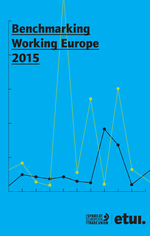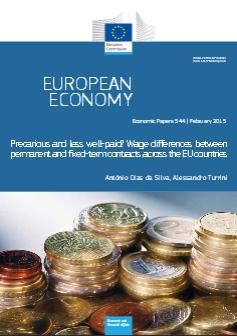Acemoglu, D., Ozdaglar, A. & Tahbaz-Salehi, A. (2015) “Microeconomic origins of macroeconomic tail risks, VoxEU Organisation, 27 March. Understanding large economic downturns is one of macroeconomics’ central goals. This column argues that imbalances in input-output linkages can interact with firm-level shocks to produce output fluctuations that are much larger than the underlying shocks. The result can be large cycles arising from small, firm-level shocks. It is thus important to …Read More
Benchmarking Working Europe 2015
European Trade Union Institute (ETUI) Benchmarking Working Europe 2015, ETUI aisbl: Βρυξέλλες, March 2015. Published every year, the report analyses the state of working Europe explaining with the aid of statistics and graphs the main trends in terms of Europe’s macro-economic situation, its labour market development, the situation of wages and collective bargaining, and worker participation. The focus of this year’s Benchmarking report is on the lessons learned – …Read More
The unspectacular Union
Nikolas Papageorgiou (2015) “The unspectacular Union“, The European Magazine, 24 March. From lobbyists to toasters: Why the EU is not as evil, opaque, or important as we think. Most people who dive into understanding how things work in Brussels find out the hard way: the way things work in this town is rarely, if ever, shocking enough to be bothered with. Like most things we hear about the European …Read More
Should the UK stay or go? The economic consequences of Britain leaving the EU
Dhingra, S., Ottaviano, G. & Sampson, T. (2015) “Should the UK stay or go? The economic consequences of Britain leaving the EU“, LSE EUROPP, 24 March. How would a British exit from the EU affect the UK’s economy? Swati Dhingra, Gianmarco Ottaviano and Thomas Sampson outline the economic consequences of a Brexit, writing that reduced integration with EU countries is likely to cost the UK economy far more than is gained …Read More
Eurozone unemployment – little to do with international competitiveness
Mitchell, B. (2015) “Eurozone unemployment – little to do with international competitiveness“, Bill Mitchell Blog, 21 March. The so-called ‘Informal European Council’ released a document on February 12, 2015 – Preparing for Next Steps on Better Economic Governance in the Euro Area: Analytical Note – which has been used as a background paper to batter the Greeks into submission in the latest round of the Eurozone crisis. It was …Read More
The Juncker Plan – the vehicle for revived European ambition?
Marty, O. (2015) “The Juncker Plan – the vehicle for revived European ambition?“, Fondation Robert Schuman – The Research and Studies Centre on Europe, European Issues – European Issue No. 347, 09 March 2015. The proposed regulation on the creation of the European Fund for Strategic Investments (EFSI) was presented by the European Commission on 13th January 2015. The trilogue is going on until the end of the Latvian …Read More
Labour and finance in the aftermath of the Great Recession
Boeri, T., Garibaldi, P. & Moen, R. E. (2015) “Labour and finance in the aftermath of the Great Recession“, VoxEU Organisation, 19 March. The Great Recession sparked the interest in the link between financial conditions and employment. This column describes results from a new model of labour and finance, incorporating financial imperfections and borrowing constraints. The results uncover a complementarity between firms holding cash and labour market imperfections. Firms …Read More
Precarious and less well-paid? Wage differences between permanent and fixed-term contracts across the EU countries
Dias da Silva . Α. & Turrini, Α. (2015) “Precarious and less well-paid? Wage differences between permanent and fixed-term contracts across the EU countries“, European Commission: European Economy – Economic Papers, No. 544, Brussels: February. This paper analyses the main features of the wage differences between permanent and fixed-term workers and what sources are driving these differences, including the role of labour market institutions. We analyse wage differences between …Read More
Think differently about the Right and the Left
Jacques Attal (2015) “Think differently about the Right and the Left, L’ Express Blog, 09 March. While political parties, doctrines and party platforms might not want to admit it, there is a certain, albeit slow, shift in the traditional Left-Right cleavage in the practice of governments all over the world: As so often happens, practice precedes doctrine and creates it. Clearly there is still on the one hand the …Read More
The ‘Juncker plan’ does not offer a genuine route to boosting the Eurozone’s recovery
Sander, H. (2015) “The ‘Juncker plan’ does not offer a genuine route to boosting the Eurozone’s recovery“, LSE EUROPP, 19 March. On 10 March, EU finance ministers agreed to roll out Jean-Claude Juncker’s flagship investment programme, commonly termed the ‘Juncker plan’. Harald Sander writes on the economic impact the plan could have in the Eurozone. He argues that while it has been portrayed by some observers as a route …Read More






